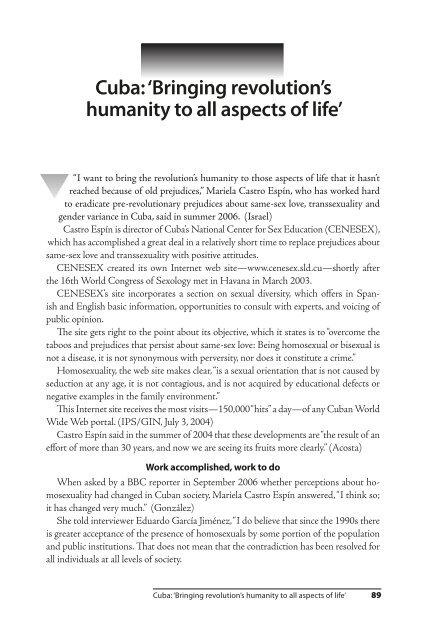LavenderRed_Cubabook
LavenderRed_Cubabook
LavenderRed_Cubabook
Create successful ePaper yourself
Turn your PDF publications into a flip-book with our unique Google optimized e-Paper software.
Cuba: ‘Bringing revolution’s<br />
humanity to all aspects of life’<br />
“I want to bring the revolution’s humanity to those aspects of life that it hasn’t<br />
reached because of old prejudices,” Mariela Castro Espín, who has worked hard<br />
to eradicate pre-revolutionary prejudices about same-sex love, transsexuality and<br />
gender variance in Cuba, said in summer 2006. (Israel)<br />
Castro Espín is director of Cuba’s National Center for Sex Education (CENESEX),<br />
which has accomplished a great deal in a relatively short time to replace prejudices about<br />
same-sex love and transsexuality with positive attitudes.<br />
CENESEX created its own Internet web site—www.cenesex.sld.cu—shortly after<br />
the 16th World Congress of Sexology met in Havana in March 2003.<br />
CENESEX’s site incorporates a section on sexual diversity, which offers in Spanish<br />
and English basic information, opportunities to consult with experts, and voicing of<br />
public opinion.<br />
The site gets right to the point about its objective, which it states is to “overcome the<br />
taboos and prejudices that persist about same-sex love: Being homosexual or bisexual is<br />
not a disease, it is not synonymous with perversity, nor does it constitute a crime.”<br />
Homosexuality, the web site makes clear, “is a sexual orientation that is not caused by<br />
seduction at any age, it is not contagious, and is not acquired by educational defects or<br />
negative examples in the family environment.”<br />
This Internet site receives the most visits—150,000 “hits” a day—of any Cuban World<br />
Wide Web portal. (IPS/GIN, July 3, 2004)<br />
Castro Espín said in the summer of 2004 that these developments are “the result of an<br />
effort of more than 30 years, and now we are seeing its fruits more clearly.” (Acosta)<br />
Work accomplished, work to do<br />
When asked by a BBC reporter in September 2006 whether perceptions about homosexuality<br />
had changed in Cuban society, Mariela Castro Espín answered, “I think so;<br />
it has changed very much.” (González)<br />
She told interviewer Eduardo García Jiménez, “I do believe that since the 1990s there<br />
is greater acceptance of the presence of homosexuals by some portion of the population<br />
and public institutions. That does not mean that the contradiction has been resolved for<br />
all individuals at all levels of society.<br />
Cuba: ‘Bringing revolution’s humanity to all aspects of life’ 89


